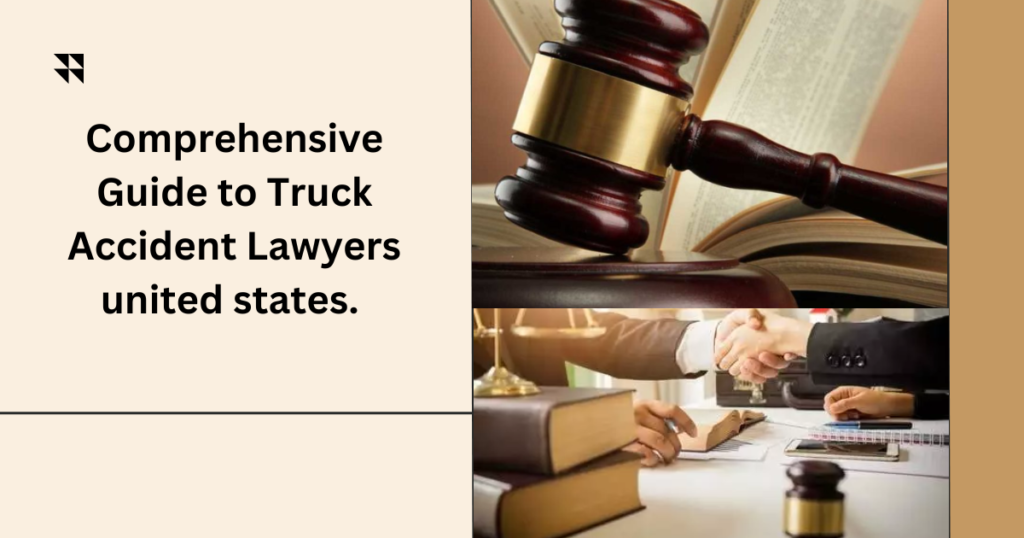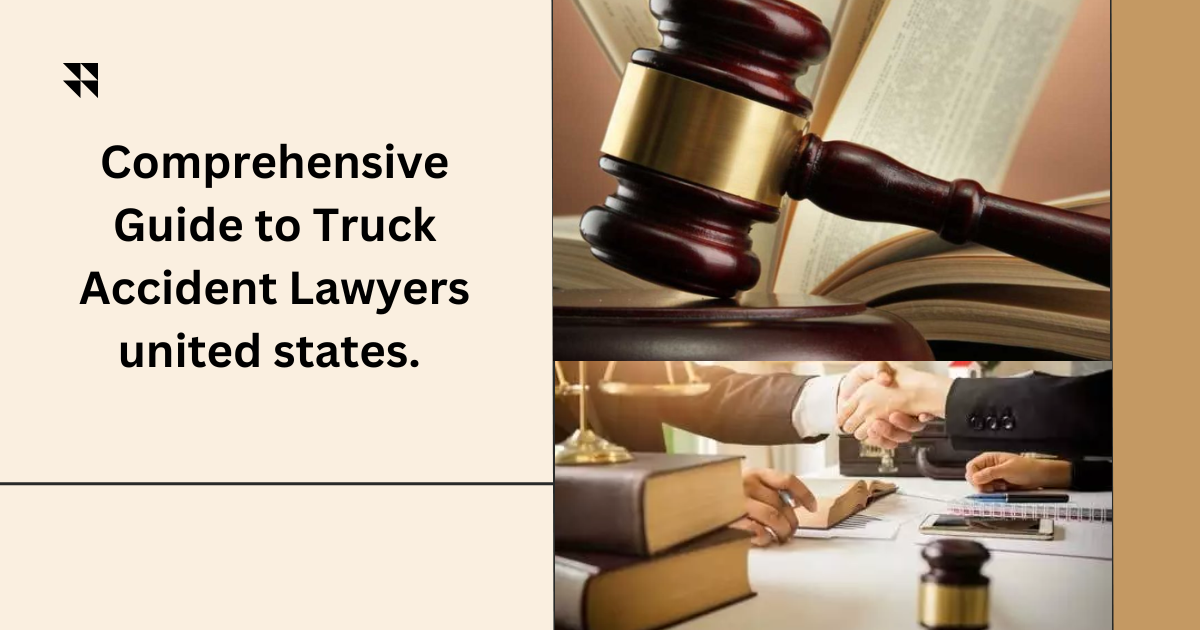Truck accidents are among the most devastating incidents on the road, often resulting in severe injuries, fatalities, and significant property damage. Due to the complexity of these accidents, it is crucial to have an experienced truck accident lawyer, also known as a crash attorney, by your side to navigate the legal process and secure the compensation you deserve. This comprehensive guide will cover all aspects of truck accident lawyers, including their roles, the legal process, types of compensation, and tips for choosing the right lawyer. With this information, you will be better equipped to handle the aftermath of a truck accident and protect your rights.
Truck Accident Lawyers
Truck accident lawyers specialize in cases involving commercial truck accidents. They represent victims who have been injured or suffered damages due to the negligence or wrongdoing of truck drivers, trucking companies, or other related parties. These lawyers have in-depth knowledge of the regulations governing the trucking industry, such as the Federal Motor Carrier Safety Administration (FMCSA) rules, and are skilled in handling the unique challenges posed by truck accident cases.

The primary role of truck accident lawyers is to advocate for their clients and ensure they receive fair compensation for their injuries and damages. Their responsibilities include investigating the accident, collecting evidence such as police reports, witness statements, and electronic logging device (ELD) data to determine liability. They also negotiate with insurance companies, communicate with insurance adjusters to negotiate settlements, and avoid lowball offers. If a fair settlement cannot be reached through negotiations, they prepare and file legal documents and represent clients in court to obtain a favorable verdict. Additionally, they provide legal advice, offering guidance on legal options and the best course of action based on the specifics of the case.
It is advisable to hire a truck accident lawyer in situations involving severe injuries or fatalities, disputed liability, insurance issues, or complex cases such as multi-vehicle accidents or accidents involving commercial trucks.
Steps to Take After a Truck Accident
After a truck accident, the immediate priority should be ensuring safety, calling emergency services, and checking for injuries. Reporting the accident to the police and obtaining an official accident report is crucial. It’s important to exchange contact and insurance information with all involved parties, including the truck driver and any witnesses. Documenting the scene with photos and videos of the accident scene, vehicle damage, road conditions, and any visible injuries is essential. Speaking to witnesses and obtaining their contact information and statements can also be helpful.
Post-accident steps include seeking medical attention, even if you feel fine initially, as some injuries may not be immediately apparent. Notifying your insurance company and providing them with the necessary details is essential. Keeping detailed records of medical treatments, expenses, and any communications with insurance companies is important. Consulting a truck accident lawyer to discuss your case and explore your legal options is highly recommended.
The Legal Process in Truck Accident Cases
The legal process begins with scheduling an initial consultation with a truck accident lawyer. During this meeting, the lawyer will review the details of your case, assess the strength of your claim, and advise you on the next steps. This consultation is usually free of charge.
Once you hire a lawyer, they will begin a thorough investigation of the accident. This involves collecting evidence, such as police reports, medical records, witness statements, ELD data, and any available video footage. The lawyer may work with accident reconstruction experts, medical professionals, and other specialists to build a strong case. They will also analyze the trucking company’s maintenance records, driver logs, and compliance with FMCSA regulations.
After gathering sufficient evidence, your lawyer will draft a demand letter to the at-fault party’s insurance company. This letter outlines the details of the accident, the extent of your injuries and damages, and the compensation you are seeking. The insurance company will review the demand letter and may either accept, reject, or negotiate the settlement amount.
If negotiations fail to result in a fair settlement, your lawyer may advise you to file a lawsuit. This involves preparing legal documents, drafting, and filing a complaint in the appropriate court, notifying the at-fault party of the lawsuit, and going through the discovery process where both parties exchange evidence and information related to the case. Lawyers may file pre-trial motions to resolve certain issues before the trial begins.
If the case proceeds to trial, both sides will present their evidence and arguments before a judge or jury. The trial process includes opening statements, presentation of evidence, witness testimonies, and closing arguments. The judge or jury will render a decision based on the evidence and arguments presented. In many cases, a settlement may be reached before the trial concludes. If a verdict is rendered, it will determine the amount of compensation you receive.
Types of Compensation in Truck Accident Cases
Truck accident victims may be entitled to various types of compensation. Economic damages are tangible, quantifiable losses resulting from the accident, including medical expenses, lost wages, property damage, and future economic losses such as projected future medical expenses and loss of earning capacity.
Non-economic damages are intangible losses that do not have a specific monetary value. They include pain and suffering, physical pain, and emotional distress resulting from the accident and injuries. Loss of consortium refers to the impact on relationships with family members, such as loss of companionship or support. Mental anguish covers the psychological impact, such as anxiety, depression, or post-traumatic stress disorder (PTSD).
In cases involving egregious or reckless behavior by the at-fault party, punitive damages may be awarded. These are intended to punish the wrongdoer and deter similar conduct in the future.
Choosing the Right Truck Accident Lawyer
When selecting a truck accident lawyer, consider their qualifications and experience. Look for lawyers who specialize in personal injury and truck accident cases, have a history of successful case outcomes and settlements, and hold credentials such as membership in professional organizations like the American Association for Justice (AAJ).
Client reviews and testimonials can provide valuable insights into a lawyer’s reputation and client satisfaction. Check online review platforms and ask for references from previous clients. Effective communication is crucial in legal cases, so ensure the lawyer you choose is accessible, responsive, and keeps you informed about the progress of your case.
Understand the lawyer’s fee structure before hiring them. Many personal injury lawyers work on a contingency fee basis, meaning they only get paid if you win your case. Clarify any additional costs, such as court fees or expert witness fees.
Frequently Asked Questions (FAQs)
After a truck accident, it is important to ensure safety and call emergency services. Report the accident to the police and obtain an official report. Exchange information with other parties involved and document the accident scene with photos and videos. Seek medical attention, notify your insurance company, and consult a truck accident lawyer.
Most truck accident lawyers work on a contingency fee basis, meaning they only get paid if you win your case. The fee is usually a percentage of the settlement or court award, typically ranging from 25% to 40%.
The time limit to file a truck accident claim, known as the statute of limitations, varies by jurisdiction. In the UK, the general time limit for personal injury claims is three years from the date of the accident.
If the at-fault driver is uninsured or underinsured, you may still be able to recover compensation through your own insurance policy, specifically if you have uninsured/underinsured motorist coverage.
While it is possible to handle a truck accident claim without a lawyer, it is not advisable, especially in complex cases. A lawyer can navigate the legal intricacies, negotiate with insurance companies, and ensure you receive fair compensation.
The average settlement for a truck accident claim varies widely based on factors such as the severity of injuries, property damage, and liability. Settlements can range from a few thousand to several million pounds.
Truck Accident Laws and Regulations
The Federal Motor Carrier Safety Administration (FMCSA) sets regulations that govern the operation of commercial trucks. These regulations are designed to ensure the safety of truck drivers and other road users. Key regulations include hours of service rules, which limit the number of hours a truck driver can be on duty to prevent fatigue, and vehicle maintenance requirements to ensure trucks are in safe operating condition. Compliance with these regulations is crucial for trucking companies and drivers, and violations can be used as evidence of negligence in truck accident cases.
Please Read More: Vehicle accident lawyers near me Best information and completed guide.
Please Read More: Truck accident lawyers near me and best United states.
Conclusion
I hope that you would have liked some other posts. Friend, if you liked this post, then you must like this post and share it with your friends. I know that you would have liked the given information very much. If you are related to this question, If you have any questions, please leave a leave a comment.
